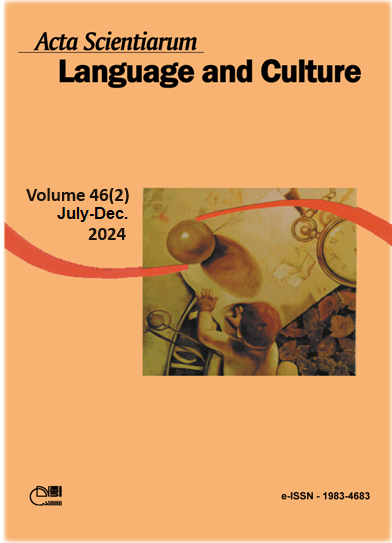The ‘Angel in the house’ and the ‘Hero’: women and wars in The years and Three guineas by Virginia Woolf
Abstract
Among the several themes addressed by Virginia Woolf throughout her literary and essayistic production, we can situate war as a major concern of her aesthetic-literary project. There were several occasions (such as the lecture ‘Professions for women’ from 1931) when it was possible to trace one of Woolf’s arguments for her attack on patriarchy: how war is thought ‘by’ and ‘for’ men. This arrangement is crucial for assimilating the conception of The years, a 1937 novel that explored the changes in the lives of women from the late 19th century to the early 1930’s and which treatment of the war ‘motif’ had among its guidelines the questioning of the ‘life of great men’ as exalted by History. The objective was to reveal the pillars of the construction of all these narratives of heroism: women having to bow their heads and kneel for centuries, serving as mirrors that reflected gigantically the figures of those men. In light of this, we propose a reading which focus comprises the characters of Eleanor and Rose Pargiter in The years, aiming to highlight the close link, especially in political-ideological terms, between female servility (and its corollaries) and male warlike articulation. For this trajectory, the author herself provides us with theoretical-methodological support with works such as Three guineas and other essays, in which this problematic was more explicitly addressed. As we've delved into her personal life as well, we cannot overlook her own concept of life-writing, referring to approaches drawing from biographical sources. Of the many bonds and domains involved in this reading endeavor, which cannot separate ethics from aesthetics, we must highlight: the domestic and civic ramifications of patriarchal society, and the relationship between male hegemony and the unfeasibility of peace.
Downloads
References
Referências
Allen, J. (2010). Virginia Woolf and the politics of language. Edinburgh, UK: Edinburgh University Press.
Briggs, J. (2010). The novels of the 1930’s and the impact of history. In The Cambridge companion to Virginia Woolf. (p. 70-88). Cambridge, UK: Cambridge University Press.
Desalvo, L., & Leaska, M. (1985). The letters of Vita Sackville-West to Virginia Woolf. New York, NY: William Morrow and Company.
Dottin-Orsini, M. (1996). A mulher que eles chamavam de fatal. Rio de Janeiro, RJ: Rocco.
Froula, C. (2005). Virginia Woolf and the Bloomsbury avant-garde: war, civilization, modernity. New York, NY: Columbia University Press.
Hussey, M. (1991). Virginia Woolf and war. Syracuse, NY: Syracuse University Press.
Iodice, E. (2018). Lessons from History: The Startling Rise to Power of Benito Mussolini. The Journal of Values-Based Leadership, 11(2), p 15-45.
Leaska, M. A. (1992). The death of a novelist. The Arts in Psychotherapy, 19(1), 193-199.
Levi, P. (2016). Os afogados e os sobreviventes. Rio de Janeiro, RJ: Paz & Terra.
McNeillie, A. (2010). Bloomsbury. In S. Sellers, The Cambridge companion to Virginia Woolf (p. 1-28). Cambridge, UK: Cambridge University Press.
Orwell, G. (1951). Homage to Catalonia. London: Secker & Warburg.
Orwell, G. (2001). The road to Wigan pier. In Reading Fiction: Opening the text (p. 126-131). London, UK: Palgrave.
Orwell, G. (2005). Why I write. London: Penguin Books.
Perrot, M. (2017). Os excluídos da história (D. Bottmann, Trad.). Rio de Janeiro, RJ: Paz & Terra.
Reader, W. (2015). ‘At duty’s call’: a study in obsolete patriotism. Manchester, UK: Manchester University Press.
Snaith, A. (2000). ‘Three guineas’ letters. Woolf Studies Annual, 6(1), p. 1-12.
Terr, L. (1990). Who’s afraid in Virginia Woolf? Clues to early sexual abuse in literature. The psychoanalytic study of the child, 45(1), 533-546.
Woolf, V. (1937). The years. London, UK: The Hogarth Press.
Woolf, V. (1982). A writer’s diary: Being extracts from the diary of Virginia Woolf. Edited by Leonard Woolf. New York, NY: Harcourt.
Woolf, V. (1985). A sketch of the past. In Moments of Being (A collection of autobiographical writing). Edited by Jeanne Schulkid. Harcourt Brace.
Woolf, V. (1992a). To the lighthouse. London, UK: Palgrave Macmillan.
Woolf, V. (1992b). The Pargiters. New York, NY: The New York Public Library.
Woolf, V. (1992c). Women and Fiction (Manuscript version of A room of one’s own - edited by S. P. Rosenbaum). New Jersey: Wiley-Blackwell.
Woolf, V. (2008). Why art today follows politics. In D. Bradshaw, Selected essays (p. 245-248). Oxford, UK: Oxford University Press.
Woolf, V. (20014). Thoughts on peace in an air raid. In V. Woolf, Virginia Woolf: essays on the self (p. 126-142). Widworthy Barton, Honiton, Devon: The Notting Hill Editions.
Woolf, V. (2015). A room of one’s own & Three guineas. Oxford, UK: Oxford World’s Classics.
Woolf, V. (2019a). Mulheres e ficção (L. Fróes, Trad.). São Paulo, SP: Companhia das Letras.
Woolf, V. (2019b). Profissões para mulheres. In V. Woolf, As mulheres devem chorar ou... se unir contra a guerra: patriarcado e militarismo (T. Tadeu, Trad.). São Paulo, SP: Autêntica.
Woolf, V. (2019c). The Waves. London, UK: Penguin Classics.
DECLARATION OF ORIGINALITY AND COPYRIGHTS
I Declare that current article is original and has not been submitted for publication, in part or in whole, to any other national or international journal.
The copyrights belong exclusively to the authors. Published content is licensed under Creative Commons Attribution 4.0 (CC BY 4.0) guidelines, which allows sharing (copy and distribution of the material in any medium or format) and adaptation (remix, transform, and build upon the material) for any purpose, even commercially, under the terms of attribution.
Read this link for further information on how to use CC BY 4.0 properly.




















6.png)









